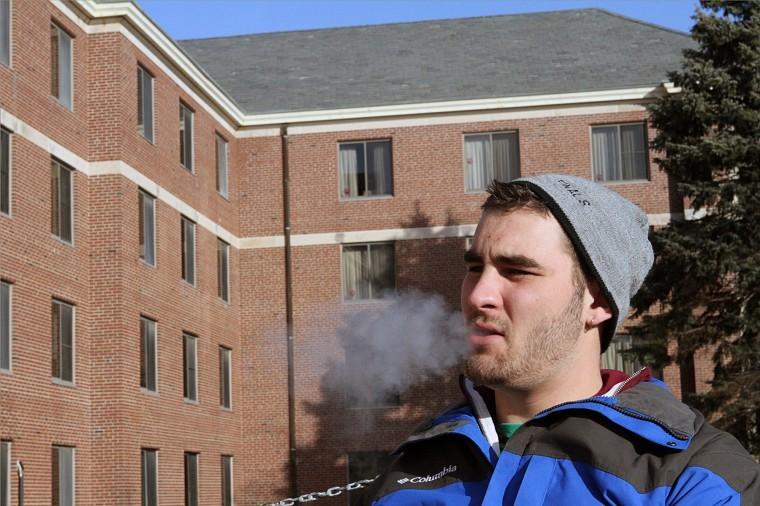Local legislators oppose state smoking ban exemption
James McClanahan, freshman music performance major, smokes a cigarette outside of Neptune North Wednesday afternoon.
February 8, 2012
In Jan. 2011, State Rep. Anthony DeLuca, D-Chicago Heights, introduced legislation that would amend the Smoke-Free Illinois Act.
The legislation would allow municipalities the choice to offer smoking licenses to eligible establishments.
According to the Smoke-Free Illinois Act, which went into effect Jan. 1, 2008, smoking in virtually all public places and workplaces is prohibited, including educational institutions, restaurants and bars.
Even if this legislation was to pass, DeKalb Mayor Kris Povlsen said he would not be in favor of offering licenses.
“It’s probably the most irresponsible piece of legislation introduced by a legislator,” Povlsen said.
Instead, state legislators should focus on more important issues, like the state’s financial crisis, Povlsen said.
State’s Attorney Clay Campbell remembers what it was like when he was 21.
Going into bars and not being able to see due to the tobacco smoke was not a fond memory from that time, Campbell said.
“Just as a private citizen, I think a smoke-free environment has become a way of life now,” Campbell said. “The science is overwhelming that second-hand smoke causes damage.”
According to a 2011 report by the U.S. Surgeon General, exposure to tobacco smoke quickly damages blood vessels throughout the body, damages a person’s DNA – which can lead to cancer- and weakens the body’s ability to fight cancer.
State Rep. Robert Pritchard, R-Hinckley, said he voted in favor of the Smoke-Free Illinois Act and against several pieces of exemption legislation that have come up since.
“I regret having to pass a bill that takes away individuals’ rights, but you have to consider the rights of the nonsmokers and the rights of the smokers,” Pritchard said.
Povlsen agrees and said “anytime there is a life safety issue, the state certainly has the right to step in.”
Rosemary Zingarelli, junior early childhood education major and smoker, said she wrote a paper in high school about the smoking ban’s effect on businesses.
Zingarelli said she understands why people don’t like smoking in public places. However, after working in the restaurant industry, Zingarelli said she saw first-hand the loss in revenue when the ban went into effect.
Zingarelli said she is a “huge advocate” for offering exemptions to businesses who apply for a license or offering separate smoking areas in restaurants or bars.
“It’s just not really that fair to us smokers,” Zingarelli said.
Although people may be used to going outside to smoke, said Chris Bahramis, shift supervisor at Daisy’s Sports Bar & Grill, 901 Lucinda Ave., he thinks installing exhaust fans would accommodate everyone.
When the ban went into effect in 2008, Rob Deshazer, manager at O’Leary’s Irish Pub and Grill, 260 E. Lincoln Highway, said they did see a decline in business – particularly their “regulars.” After about 45 days, most came back, Deshazer said.
“As a non-smoker, I believe people should have the opportunity to smoke as long as it’s in designated areas and not offending anyone,” Deshazer said.
However, having a smoking environment in a closed facility is unhealthy, Pritchard said, and his constituents have continually opposed weakening the smoking ban.



